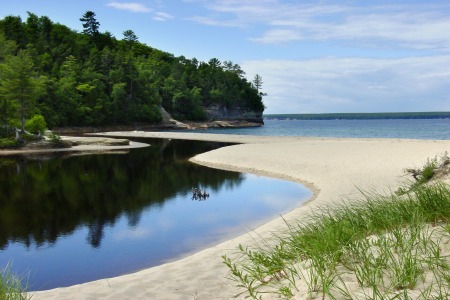
This week, Congressman John D. Dingell (D-MI12) joined Rep. Dave Joyce (R-OH14), Rep. Sandy Levin (D-MI09), Rep. Candice Miller (R-MI10), Rep. Louise Slaughter (D-NY25), and Rep. Tom Petri (R-WI06) to introduce a bipartisan Great Lakes package that would authorize comprehensive programs to protect the Great Lakes and boost economic growth in the Great Lakes region.
The Great Lakes Ecological and Economic Protection Act of 2013, H.R.2773, would address invasive species problems, coordinate protection and restoration efforts, and bring together business and environmental organizations with a shared interest in the Great Lakes.
“As a lifelong outdoorsman and conservationist, I firmly believe that we owe it to future generations to restore and protect a national treasure such as the Great Lakes,” said Dingell. “We have made great strides over the decades to bring back native species populations, improve the water quality, and bring back recreation opportunities and this legislation will significantly help continue those efforts.”
“The Great Lakes is one of the jewels of the United States and it’s imperative we protect it for its environmental significance but also because of its economic might,” said Joyce. “Studies have shown more than 1.5 million jobs are directly connected to these five lakes, generating $62 billion in wages. I’m proud to be part of the bipartisan group fighting for our Great Lakes.”
“Congress needs to do more, not less, to protect the Great Lakes and provide resources for their full restoration,” Levin said. “The bill we are sponsoring today is a major step in the right direction, but it will be essential for Congress to follow up and provide the resources to fully fund all these vital Great Lakes programs and initiatives.”
“The Great Lakes are an environmental treasure to both our economy and natural resources; protecting them is of the utmost importance,” Miller said. “As legislators, it is imperative we ensure that the right policy is in place to provide needed and long-term framework to sustain the Great Lakes. We must continue to move forward vital Great Lakes restoration projects and programs aimed at sustaining the natural habitats and protecting against invasive species and pollutants.”
“I am proud to join my colleagues on both sides of the aisle in supporting and protecting the Great Lakes – a source of 20 percent of the world’s surface fresh water and generator of 1.5 million jobs,” said Rep. Slaughter, Co-Chair of the Great Lakes Caucus in the House. “This legislation will improve water quality, rid our water of invasive species and help clean up our beaches – especially Ontario Beach in my district – spurring tourism and expanding recreational activity opportunities.”
“It’d be difficult to exaggerate the impact that the Great Lakes have on regional commerce, tourism, recreation, and transportation. And we’ve only scratched the surface of potential in some of these areas,” Petri said. “It’s absolutely vital that we have in place good policy to make sure that future generations are able to enjoy the Great Lakes that are free from pollution, deterioration, and invasive species, which can all have serious long-term consequences. As a member of the Great Lakes Task Force in Congress, I am pleased to be working with my colleagues on both sides of the aisle to protect this great natural resource.”
GLEEPA would:
Authorize the Great Lakes Restoration Initiative, an action-oriented, results-driven initiative targeting the most significant problems within the basin, including aquatic invasive species, toxics and contaminated sediment, nonpoint source pollution, and habitat and wildlife protection and restoration.
Reauthorize the Great Lakes Legacy Act which has successfully at removed contaminated sediment from the U.S. Areas of Concern (AOC).
Reauthorize the Great Lakes National Program Office, the primary liaison between all Great Lakes programs and the EPA
Authorize The Great Lakes Interagency Task Force (IATF) which would bring together eleven U.S. Cabinet secretaries and federal agency heads to coordinate restoration of the Great Lakes amongst the different agencies.
Authorize the Great Lakes Advisory Board (GLAB), which will be composed of members representing a broad range of interests across the Great Lakes including, business, environmental groups, agricultural groups, foundations, youth groups, environmental justice groups, and academia. The GLAB will provide recommendations to the IATF on matters pertaining to Great Lakes restoration and protection.
